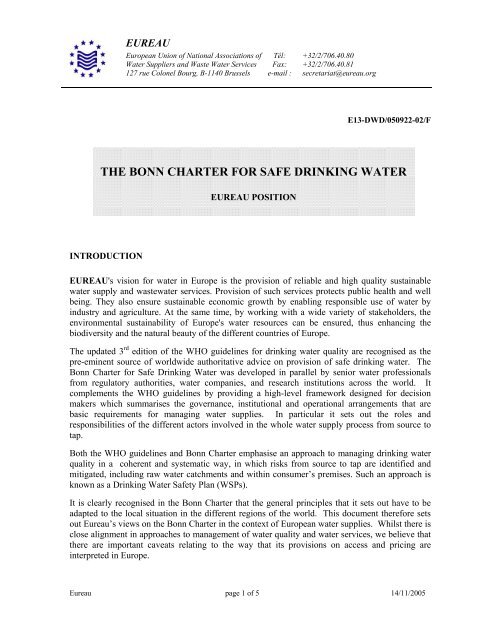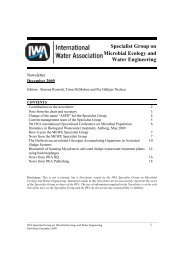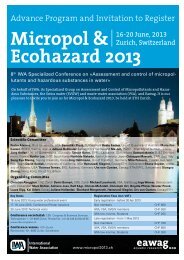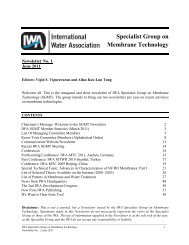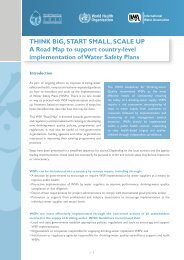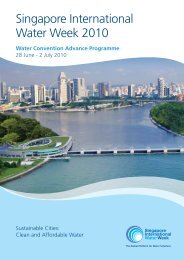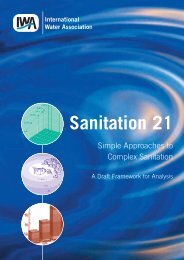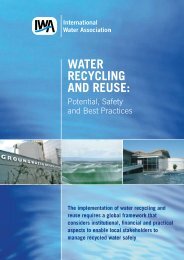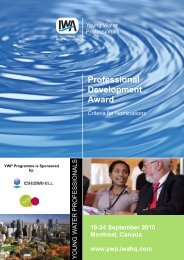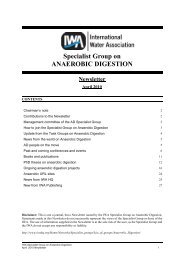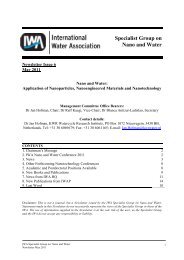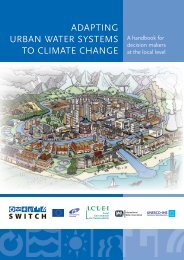THE BONN CHARTER FOR SAFE DRINKING WATER - IWA
THE BONN CHARTER FOR SAFE DRINKING WATER - IWA
THE BONN CHARTER FOR SAFE DRINKING WATER - IWA
You also want an ePaper? Increase the reach of your titles
YUMPU automatically turns print PDFs into web optimized ePapers that Google loves.
EUREAUEuropean Union of National Associations of Tél: +32/2/706.40.80Water Suppliers and Waste Water Services Fax: +32/2/706.40.81127 rue Colonel Bourg, B-1140 Brussels e-mail : secretariat@eureau.orgE13-DWD/050922-02/F<strong>THE</strong> <strong>BONN</strong> <strong>CHARTER</strong> <strong>FOR</strong> <strong>SAFE</strong> <strong>DRINKING</strong> <strong>WATER</strong>EUREAU POSITIONINTRODUCTIONEUREAU's vision for water in Europe is the provision of reliable and high quality sustainablewater supply and wastewater services. Provision of such services protects public health and wellbeing. They also ensure sustainable economic growth by enabling responsible use of water byindustry and agriculture. At the same time, by working with a wide variety of stakeholders, theenvironmental sustainability of Europe's water resources can be ensured, thus enhancing thebiodiversity and the natural beauty of the different countries of Europe.The updated 3 rd edition of the WHO guidelines for drinking water quality are recognised as thepre-eminent source of worldwide authoritative advice on provision of safe drinking water. TheBonn Charter for Safe Drinking Water was developed in parallel by senior water professionalsfrom regulatory authorities, water companies, and research institutions across the world. Itcomplements the WHO guidelines by providing a high-level framework designed for decisionmakers which summarises the governance, institutional and operational arrangements that arebasic requirements for managing water supplies. In particular it sets out the roles andresponsibilities of the different actors involved in the whole water supply process from source totap.Both the WHO guidelines and Bonn Charter emphasise an approach to managing drinking waterquality in a coherent and systematic way, in which risks from source to tap are identified andmitigated, including raw water catchments and within consumer’s premises. Such an approach isknown as a Drinking Water Safety Plan (WSPs).It is clearly recognised in the Bonn Charter that the general principles that it sets out have to beadapted to the local situation in the different regions of the world. This document therefore setsout Eureau’s views on the Bonn Charter in the context of European water supplies. Whilst there isclose alignment in approaches to management of water quality and water services, we believe thatthere are important caveats relating to the way that its provisions on access and pricing areinterpreted in Europe.Eureau page 1 of 5 14/11/2005
COMMENTS ON ASPECTS OF <strong>THE</strong> <strong>BONN</strong> <strong>CHARTER</strong> IN <strong>THE</strong> EUROPEANCONTEXTEureau has carried out a survey among its members to assess the extent to which the principlesoutlined in the Bonn Charter and WHO guidelines are already adopted. In general, these seem tofit well with the way that provision of water supplies has developed in Europe. For exampleacross Europe, there are very rigorous independent regulatory systems to control the quality ofwater which closely follow the principles set out in the Charter.There are however, a number of aspects which need to be interpreted in a European context.Drinking Water Safety PlansMany water suppliers have already adopted the practices set out in the Charter in their field ofresponsibility and this is demonstrated by the high quality of water provided by those companies.In this context, EUREAU firmly supports the principle of risk based process management (WSP)as an effective complement to, or in some areas alternative to, numeric parametric standards. In anumber of MS, work is already in progress to develop a more consistent national framework forimplementation of the DWSP concept. However, there would be benefit in adopting the WSPconcept set out in the WHO guidelines and the Bonn Charter but under the principles ofsubsidarity in a way which is sufficiently flexible to be adapted to local situations, butnevertheless retains a number of common concepts. In doing so, the following key points must betaken fully into account:-‣ Current management practices by most water suppliers already incorporate many of theprinciples of the WSP approach. We therefore see no benefit in formalising the approachby regulatory means at a European level.‣ Given the wide variety of water supply systems and institutional arrangements in differentMS, we believe that a common European Framework could apply the principles of theWSP approach at a local Member State level.‣ Whilst water suppliers are very willing to play an active and even leading part in WSPs,source water protection and plumbing systems are in general outside their responsibility,except where locally some water suppliers on a voluntary or contractual basis takeresponsibility of the protection of the sources. It is therefore vital that the responsibilitiesof all are properly and clearly defined.‣ In particular stronger action has to be taken to vigorously implement EU policy forcatchment protection.‣ It is of vital importance that the approach encompasses the whole water supply processfrom raw water source to tap. This requires an active partnership between a wide range ofstakeholders including property owners.Eureau page 2 of 5 14/11/2005
‣ Whilst Eureau supports the idea of third party verification of operating procedures, themechanism for achieving this needs to be flexible enough to take into account the differentapproaches that have been adopted in MS. For example in some countries, technical codesof practice are verified by independent quality assurance schemes.‣ For smaller supplies, there may be merit in exploring whether a more Generic simplifiedguidance document would be of value.‣ A full debate needs to take place to establish the extent to which other policy instrumentsmight be better able to achieve the desired results compared to legislationCatchment ProtectionA key principle of European water policy, which is fully supported by EUREAU, is that pollutionshould be dealt with as close to the point of origin as possible. This particularly applies to theneed to provide high levels of protection of drinking water sources, which is enshrined in Article 7of the Water Framework Directive and the proposed new Groundwater Directive. Such anapproach is increasingly important in view of the growing evidence of climate change which couldlead to further deterioration in raw water because of increased storm runoff and highly variableriver flows.EUREAU has previously supplied a number of reports and papers to the European Commission,which illustrates that there is a very significant and probably growing problem in Europe withcontamination of raw water sources. This particularly applies to pesticides and nitrates, which arewidespread problems across Europe, but can also cover other pollution from widely used syntheticchemicals such as pharmaceuticals, flameproofing substances, or chemical complexing agents.This must be a priority for EU policy implementation.In addition and as set out in the report of the joint workshop between EUREAU and theCommission, we believe that much stronger measures need to be put in place to prevent accidentalpollution of water sources through spillage of chemicals, oil or other materials.Control of Water Quality beyond the Water Companies PipesArticle 6.2 of the current Drinking Water Directive removes Member States obligations wherenon-compliance with standards is due to deficiencies in the plumbing or fittings in privatedomestic properties. However, this exemption does not apply to buildings where water is suppliedto the public. Additionally Member States do have a responsibility under Article 6.3 to inform allcustomers of any such risks and take any other appropriate measures to reduce the risk.EUREAU would support further moves at European level to provide a DWSP framework withinwhich consumers and property owners could be given better advice on how they should install andmaintain their internal plumbing systems and also buy pipes and fittings which are of appropriatequality. At the same time, it must be recognised that managing risks from plumbing in privateproperties should be primarily the responsibility of Member States through the principle ofsubsidarity.Eureau page 3 of 5 14/11/2005
EUREAU is already actively supporting development of the European Acceptance Scheme (EAS)which relates to materials used by utilities under the Construction Products Directive as well asthose used in domestic installations, We would support better links between this legislation andthe quality requirements of the DWD, particularly to deal with the problem of new materials usedinside buildings, although this will not deal with problems which arise from existing installations.Application to small suppliesThe charter tends to be written primarily from the perspective of larger public water supplies.However, it is clear that across many parts of Europe, there are a range of potential problems withsmaller supplies, particularly where these are privately owned self-supplies, to which the chartermay not apply as fully. Eureau would support the need for guidance document applicable to smallsupplies at EU level.Control at State or local government levelIn some countries with local or regional forms of government, it is important to recognise thatprimary responsibility for water issues tends to be with local municipal or regional government,compared to national Governments. In addition, the development of WSPs should be seenprimarily as a process to strengthen local self-control with input from Government beingminimised.Water pricingEureau supports the general principle set out in the Charter that every person should have accessto safe drinking water. We believe that this is already the case in Europe.It is however, clear that the provision of public water supplies in Europe is a service, which has tobe paid for as required under the cost recovery requirements of the Water Framework Directive.Eureau believes that water prices should not be set on the basis of income but would support,where necessary, people on lower incomes being subsidised through the Government socialsecurity system to ensure that they have adequate access to safe drinking water.IMPLEMENTATION GOALSEureau believes that the international goal of the Bonn Charter“Good safe drinking water that has the trust of consumers”.is already largely achieved in Europe due to the existing regulations on drinking water which bydefinition is required to be safe and of good quality.Nevertheless, we recognise that achievement of this goal requires continuous efforts by all partiesincluding particularly water suppliers.Eureau page 4 of 5 14/11/2005
Eureau is very willing to continue to work with the European Commission and WHO to explorehow these principles can be further promoted across Europe. It is, however, important that theapproach is rolled out with care and with sufficient time to implement properly through a processof evolution not revolution. It is also vital to recognise that a wide range of stakeholders, changingbetween Member States, must be involved through a fair and balanced responsibilitiesallocation, if we are to achieve a comprehensive “source to tap approach”.Eureau page 5 of 5 14/11/2005


